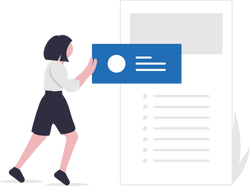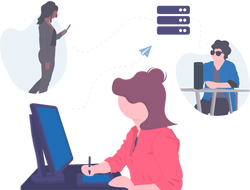Empowering education through secure and accessible digital learning with voice recognition.
Key Metrics
User Population Reached:
Loren Ipsum
Tech Stack:
Loren Ipsum
Background
An NGO working to improve numeracy and literacy among young children (4-8 years old) in remote African communities faced significant challenges. Limited internet connectivity, low-end devices, and the inability to use traditional login methods posed obstacles to their digital learning program. Tekdi Technologies collaborated with the NGO to develop a voice-based authentication system, enabling secure and accessible learning for children in these resource-constrained environments. This innovative solution has facilitated learning progress tracking and improved educational outcomes for children across diverse demographics.
Problem Statement & Objectives
The NGO's mission to enhance numeracy and literacy was hampered by several factors:
Connectivity Challenges: Many schools lacked reliable internet access, and some had no connectivity at all.
Device Limitations: The distributed tablets were low-end devices with limited processing power and memory.
Authentication Barriers: Traditional username/password logins were unsuitable for young children.
The primary objective was to create a robust, user-friendly, and secure authentication system that could function offline, operate on low-end devices, and be easily used by young children.
Approach & Process Followed
Tekdi Technologies designed a voice-based authentication system to address these challenges. The approach included:
Voice Recognition Technology: Implemented a voice recognition system that allowed children to log in using their voices. Pre-recorded voice samples were collected for each student.
Offline Functionality: Designing the system to work offline, accommodating schools with limited or no internet connectivity.
Low-End Device Compatibility: Optimizing the solution to function smoothly on tablets with limited RAM and CPU.
Language Agnostic Design: Developing a machine learning model capable of recognizing voice samples in various regional African languages, overcoming the language barrier.
Data Privacy and Security: Addressing the legal and ethical considerations of collecting and storing children's voice samples.
Outcomes
Secure and Child-Friendly Authentication
The voice-based system provided a secure and intuitive login method for young children, eliminating the need for complex passwords.
Enhanced Accessibility
The offline functionality ensured that learning could continue uninterrupted, even in areas with poor internet connectivity.
Improved Learning Progress Tracking
The authentication system allowed for accurate tracking of individual student's learning progress.
Scalability and Adaptability
The machine learning model's language-agnostic nature ensured the solution could be scaled and adapted to different regions and languages.
Impact Achieved in terms of
Business Impact:
Enabled the NGO to effectively implement and manage their digital learning program in challenging environments.
User Impact:
Provided young children with access to educational resources and a secure, user-friendly way to engage with the learning platform.
Tech Stack
Programming Languages & Development Environment-
Kotlin: Used for implementing the voice authentication logic in Android applications.
Android (Android Studio): Development environment where the SDK is integrated and configured using Gradle.
Machine Learning Model (Inference & Processing)-
Voice Authentication Model (Speaker Recognition System)- Recurrent Neural Networks (RNNs) for speaker verification.
ML Frameworks Used: ONNX –ML model is being ported across different frameworks
Vector Database for Voice Embeddings- Voice samples are converted into vector representations and stored for matching.








